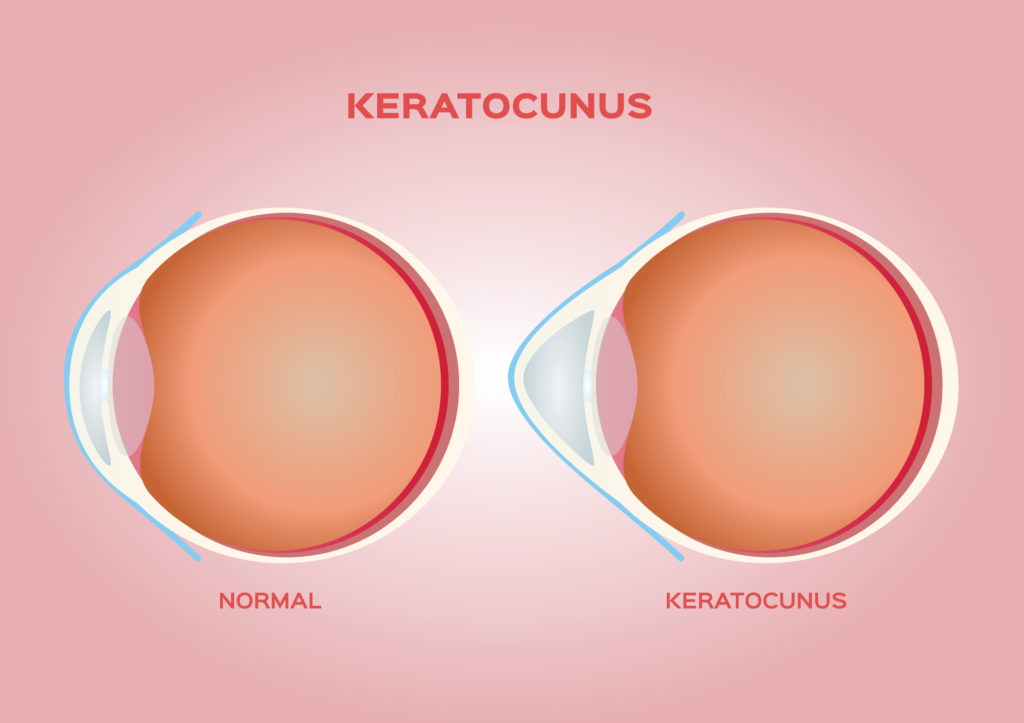
Keratoconus, also known as the conjunctiva stratus, is an eye disease that causes a central vision problem
It happens most commonly in people who are between twenty and sixty years old. Keratoconic eyes have no visible symptoms until one or more of the following complications develops: increased sensitivity to light, loss of peripheral vision, blurred vision, headaches, dry eyes and facial itching. If left untreated, keratoconic eyes can cause permanent blindness and can damage the retinas, corneas, lenses and nerves that surround the eye. If you experience any of these symptoms, please seek medical attention right away.
Keratoconic eyes are when the iris thins and bulges as a cone-shaped, disc-like structure. Because of this, your vision becomes blurred and distorted, causing normal everyday activities such as reading or driving very difficult. Because it has no obvious symptoms, keratoconic eyes are often misdiagnosed. In some cases, doctors do not understand why people develop keratoconic eyes. Some researchers believe that it could be genetically passed down in families; others suggest that it may be a condition caused by the overproduction of the vitamin A beta carotenoids.
Keratoconic eyes usually respond well to treatment. Topical anti-inflammatory drugs such as ibuprofen and aspirin can reduce the inflammation that occurs. These drugs also help to relieve symptoms associated with keratoconic eye problems. LASIK surgery is an option for those patients whose vision has been seriously impaired due to keratoconic eye problems. LASIK surgery involves cutting away a piece of the cornea with the use of lasers to correct vision problems caused by keratoconus eye problems.
Many treatments are available to help patients cope with keratoconic vision problems. These include glasses, contact lenses, special prescription contacts, bifocal and refractive surgery. Keratoconic patients may even be able to wear prescription sunglasses.
Keratoconic eyes should not be left untreated if the patient experiences any of the above mentioned vision problems. If, however, they are left alone, then the patient's vision can return to normal over time. If, however, the vision becomes more pronounced and cannot be treated, then the eye doctor will recommend surgery.

Vision therapy is another option that can help people with keratoconus restore normal vision
This type of therapy involves the use of specially designed glasses, contact lenses and/or refractive surgery. The goal of this type of therapy is to increase the patient's natural ability to see so that he or she can see the world again.
Vision therapy is based on the premise that people with keratoconus have problems because their eyes have difficulty adjusting to the changes in visual stimuli, such as near and far objects. The therapy works by training the eye to change its focus and adjust to the changing light. If your eyes can focus on a bright light, then you can read, drive, walk or watch television more easily. Vision therapy usually takes place at a clinic that can provide you with contact lenses or a doctor who can fit you with eyeglasses.
Vision therapy may be used on a continuous or intermittent basis. If the problem is particularly bad, then it may be necessary to continue with treatment. Most vision therapy is done on a schedule that is determined by a licensed ophthalmologist. Depending on your symptoms, your eye doctor may choose to use one form of treatment or several forms of treatment to treat your condition.
Vision therapy is not recommended for all keratoconic patients, however. If your vision has become so poor that the doctor cannot see what is wrong, then vision therapy is not right for you. Keratoconic patients also can receive other treatments that address the eye condition. Some of these include:
Vision Therapy may be used alone or in combination with any of the other treatments. For example, if your Keratocorus contacts don't improve the quality of your vision, then you can use eyeglasses with a stronger lens or lenses with less distortion. This type of therapy also might be combined with laser or corneal ablation. if you have keratoconus.
Vision therapy should be discussed with your eye doctor prior to beginning any form of treatment for keratoconus. It is also important that you discuss this type of therapy with your eye doctor if you are planning to drive, operate machinery, operate a car or do other activities that require strong visual skills.